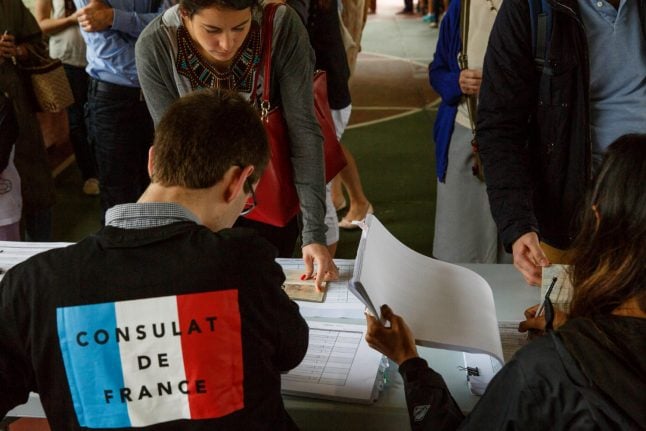Hundreds of thousands of French nationals are eligible to vote in the United States, Canada and Latin America in one of the most unpredictable elections in decades, seen as crucial for the future of a deeply divided country and the European Union.
Voting also began Saturday in many of France's overseas territories, such as the islands of Martinique and Guadeloupe in the Caribbean.
In Montreal images showed queues of voters stretching back 1.5km.
“We are voting for change,” Laurence Gaelle told The Local.
“I have voted for several french elections (living in Montreal) and generally it's an in and out process of 25 min, today we waited in line for 2h30.
“The lines were longer once I left at 11h30.”
In the rainy US capital Washington, voters cast their ballots in the election's first round at a polling station at the French embassy.
Adrien Gontier said he was fulfilling his duty as a citizen.
“In the United States, you can see what happens when people don't vote, or vote badly,” he said. “We don't want there to be a Trump in France.”
US President Donald Trump's election in November on the heels of Britain's decision to leave the European Union has prompted concern among critics that the French far-right candidate Marine Le Pen could be next to victory.
Another voter in Washington, Marianne Hart, said she believed the overseas voting would influence the elections.
“Everyone who lives abroad or has experienced it has a more open-minded view of the world,” she said.
A total of 119,773 French voters are registered in the United States, including 11,242 in Washington. That is 30 percent more than for the first round of the last presidential elections in 2012, according to the embassy.
Security measures were strengthened at the 69 polling stations across the country, it said, following a jihadist's killing of a policeman in Paris this week that put the country on edge.
The French consulate in New York, on Fifth Avenue across from Central Park, was briefly evacuated late Saturday after a suspicious vehicle raised fears of a bomb threat.
“After the Champs Elysees attack, the New York police department was told to be especially vigilant,” Consul General Anne-Claire Legendre said.
In France, nearly a quarter of voters are still undecided. Surveys showed that the French have been more concerned until now about jobs and the economy than terrorism.
But analysts warned that the policeman's killing could shift opinions, possibly handing an advantage to candidates seen as taking a hard line on security, such as Le Pen.
She and 39-year-old centrist former banker Emmanuel Macron are leading the polls. But the race has tightened in the final days and any one of four candidates could reach the runoff vote on May 7.
In the Argentine capital Buenos Aires, voters cast their ballots at a polling station in the French embassy, housed in the grandiose Ortiz Basualdo Palace.
Retired doctor Pierre Aguerre, 78, said he was taking part “against the extreme right.”
“This is an important moment in the history of France,” he said.
“A lot of people have come to vote,” his wife, Noemie Nabel, 75, said. “I think the attacks have mobilized people.”
Caroline Rostain, 41, said she was surprised by a campaign that included corruption allegations and fluctuating polls.
“I was disappointed by so much lack of transparency and ethics during the campaign,” she said. “I think we're lagging behind our European neighbours.”
Join The Local on Sunday for LIVE coverage of the French presidential election




 Please whitelist us to continue reading.
Please whitelist us to continue reading.